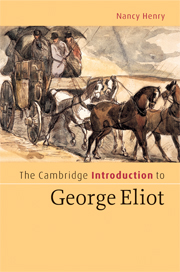Chapter 2 - Historical contexts
Published online by Cambridge University Press: 05 September 2012
Summary
In Felix Holt, George Eliot wrote, “there is no private life which has not been determined by a wider public life” (FH, I:3). All of her works situate her characters' lives in relation to the broader social conditions – or context – of their times. Similarly, we must understand her writing within the public context of nineteenth-century society and culture. In determining which of the virtually limitless aspects of nineteenth-century life and thought are most relevant to the interpretation of her work, we may take our clue from the texts themselves. In order to comprehend what Eliot's works achieved and conveyed in their time – and therefore to appreciate them in our own – we need a basic knowledge of four interrelated categories: religion, science, politics, and culture.
Many of Eliot's works are set in the early decades of the nineteenth century, the period of her parents' rather than her own adulthood. With historical hindsight, she was able to explore the influence of the immediate past on the present generation, including on herself. This past is described in Impressions of Theophrastus Such by a narrator/author whose Midlands childhood was similar to that of Mary Ann Evans, including a conservative father “born much about the same time as Scott and Wordsworth” who spoke nostalgically about the good old days:
Altogether, my father's England seemed to me lovable, laudable, full of good men, and having good rulers, from Mr. Pitt on to the Duke of Wellington, until he was for emancipating the Catholics; and it was so far from prosaic to me that I looked into it for a more exciting romance than such as I could find in my own adventures …
(TS, 2).- Type
- Chapter
- Information
- The Cambridge Introduction to George Eliot , pp. 14 - 29Publisher: Cambridge University PressPrint publication year: 2008



